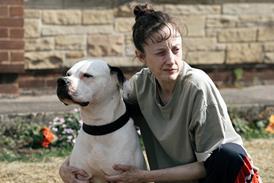With the exception of Davis Films' comic-book adaptation Solomon Kane, which began filming on location in Prague in early January, the streets and sound stages of Eastern Europe are mostly silent right now. The US writers' strike is damaging the production business at all levels, from major facilities such as Barrandov, to the smaller operations.
"All American projects have been postponed," says Barrandov spokesperson Dusana Chrenekova. However, Mark Gill and Neil Sacker's The Film Department is planning a March shoot for Marcel Langenegger's Second World War drama Brothers In Arms in Prague.
Chrenekova says Barrandov is concentrating on commercials and European projects. "We estimate at least a six-month delay (on US projects)."
Radomir Docekal, general manager of Prague Studios, says his outfit is negotiating with three to four US independent projects which could wrap production before June 30. The projects have not been confirmed however and Docekal points out that if a film's cast requires changes to the script, nothing can be done until the writers' strike is resolved.
"Two or three months ago it looked like we would be full (this spring), but it's been put on hold," Docekal confirms.
In the event of a prolonged drought for feature production, Docekal says Prague Studios will focus on commercials. He says some US projects have already enquired after studio space in September and October when the threat of an actors' strike would have passed (the Screen Actors' Guild is due to begin its own negotiations with the producers in June).
Nu Boyana Film Studios, based in Bulgaria, however, feels more secure. Owned by the US-based Nu Image, the facility is not experiencing the same bottom-line pressure experienced by other operators in the region.
"There are a few projects that are on hold but mainly these are for bigger productions," says Joost Scholte, new projects development manager at Nu Boyana. He adds that several Nu Image projects were already scheduled for Nu Boyana in 2008.
FILM WEEK SHOWS A STRONG HAND
The prestigious Hungarian Film Week (Jan 29-Feb 5) showcases the best of local film-making. Theodore Schwinke looks at a selection of titles making their debut
Although uncertainty hangs over international production in Budapest, the local creative industry remains bullish, as evidenced by the broad range of films at this month's 39th Hungarian Film Week (January 29-February 5).
The annual showcase of Hungarian film is popular among international festival programmers who will be looking carefully at the world premieres, meeting with film-makers, and taking an early measure of a new crop of Hungarian talent.
Eleven local films make their world premiere at this week's Hungarian Film Week, and look set to make their mark on the festival circuit this year.
Of these, Delta, from dynamic young director Kornel Mundruczo, about a man's homecoming in a quasi-fantastical sci-fi world, is one to watch. Mundruczo's 2002 film, Pleasant Days, won a Silver Leopard at Locarno, while his Johanna won the best director award at that year's Hungarian Film Week.
Robert Alfoldi's feature debut, Tranquility, is also screening during Film Week. The film, set towards the end of Hungary's Communist era, looks at the traumatic subject of mental illness. The script is based on Attila Bartis' novel A Nyugalom, which was a huge success in German-speaking territories, where it was published as Die Ruhe.
Another Hungarian film to watch is Attila Gigor's The Investigator, about a man who commits murder in order to pay for his mother's cancer treatment. It is produced by Ferenc Pusztai, a renowned talent-spotter who also produced Agnes Kocsis' 2006 film Fresh Air, which travelled widely on the festival circuit and won a Golden Iris for best film at the Brussels European Film Festival.
Hungarian Film Week will also screen three world premieres outside competition: Peter Forgacs' experimental film, Own Death, an adaptation of Hungarian author Peter Nadas' novel My Own Death; Csaba Bereczki's docu-drama Song Of Lives about gypsy musical heritage and Ferenc Moldovanyi's docu-drama Another Planet.

















No comments yet